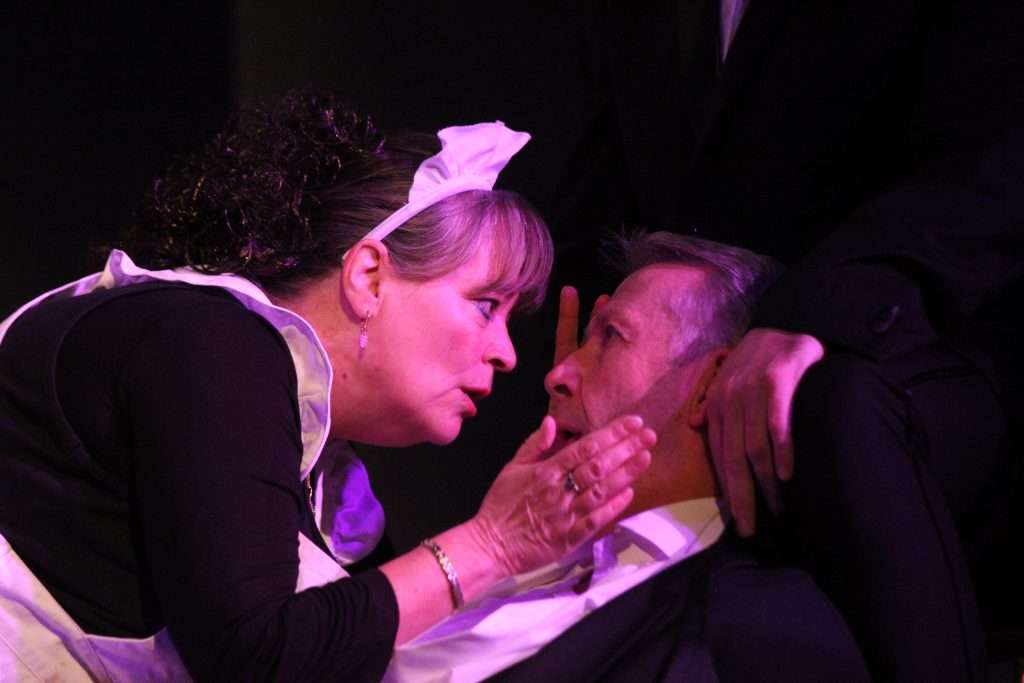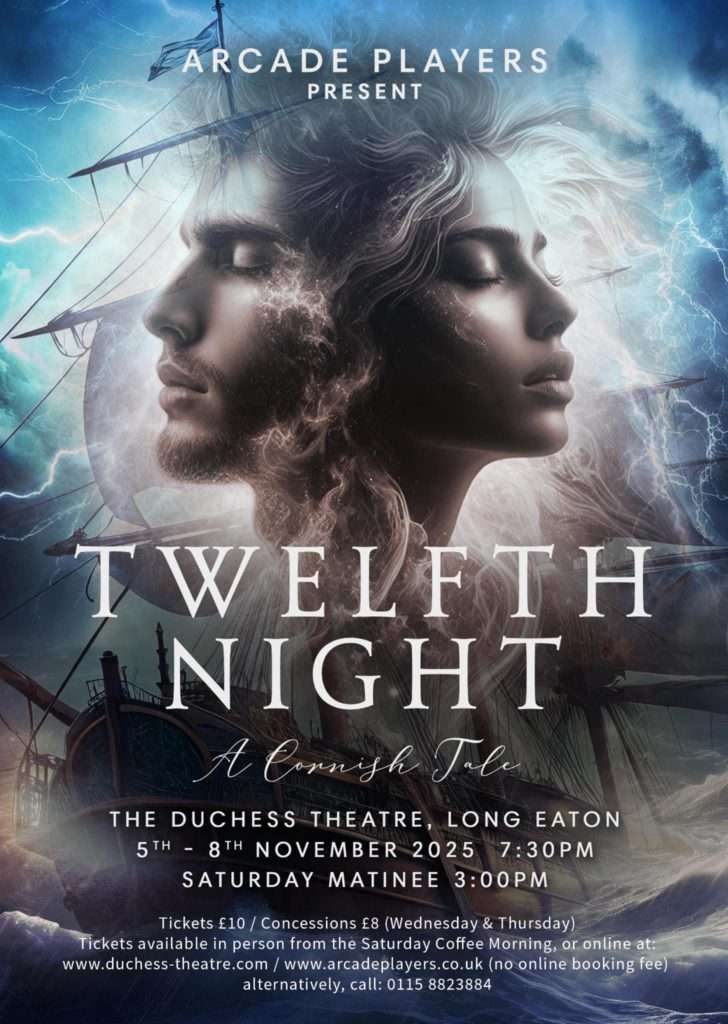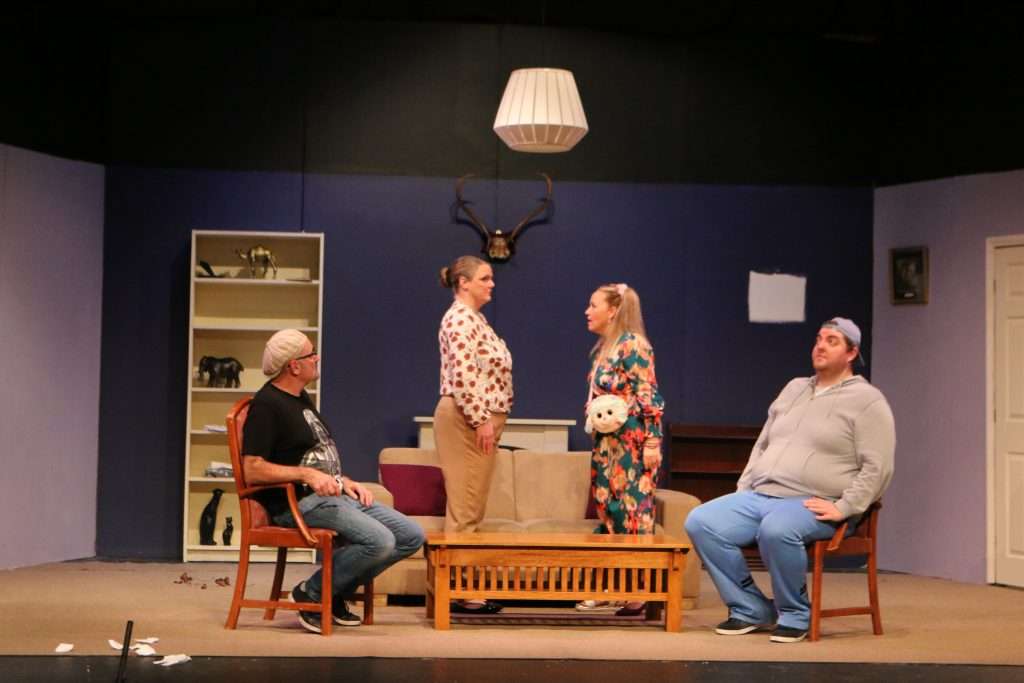What Are the Different Play Genres? An In Depth Guide
11-minute read time
If you’ve ever sat in the front row of a farce and laughed until your sides hurt—or held your breath through the final moments of a murder mystery—you’ve already experienced the magic of theatrical genres. In the world of drama, genre is the word we use to describe the style and tone of a play. It tells us whether to expect laughter, suspense, heartbreak, or sometimes all three.
Understanding different play genres isn’t just useful for students or critics. It helps audiences know what to expect, gives performers a foundation to build their characters, and lets theatre companies like ours curate a season that speaks to the full range of human experience.

At Arcade Players, we believe theatre should never be one-note. That’s why our productions span the full spectrum of genres—from quick-witted comedies to nail-biting thrillers, and from heartfelt dramas to timeless classics. In this guide, we’re diving into the main theatrical genres, explaining what sets them apart, and highlighting how we bring them to life on our stage in Long Eaton.
1. Comedy
If drama is the heart of theatre, comedy is its beating laugh track. Comedy has been a staple of the stage for centuries—offering light relief, poking fun at social norms, and celebrating the joy of the ridiculous. At its core, comedy aims to entertain. But the best comedies do more than just raise a chuckle—they reveal something truthful underneath the laughs.
What Is a Comedy Play?
A comedy is typically a play that ends happily and uses humour as its main storytelling tool. That humour might come from mistaken identities, witty dialogue, physical mishaps, or clever satire. Timing is everything. A well-delivered line or perfectly placed pause can change the whole rhythm of a scene.
Sub-genres of Comedy
- Farce – Fast-paced and full of chaos, farces thrive on misunderstandings, slamming doors, and characters who always arrive at the worst possible moment. We’ve had great fun with this style in shows like Two Into One, Out of Order, and Caught in the Net.
- Dark Comedy – Humour with a twist of something sinister or sad. These plays walk the line between laughing and wincing, often tackling serious themes with a smirk.
- Romantic Comedy – Think mismatched lovers, comic mix-ups, and feel-good endings. Romance with a playful edge.
Why Audiences Love It
Comedy is a release. It’s the sound of a room full of strangers laughing together—one of the purest joys you’ll find in theatre. Whether it’s slapstick silliness or sharp wordplay, a good comedy reminds us not to take life too seriously.
Performing Comedy: The Craft Behind the Chaos
As actors, we know comedy isn’t just about being funny. It’s about precision. The pacing, the energy, the instinct to land a line—it all takes rehearsal and rhythm. In a comedy, the audience is your scene partner, and every laugh is a response you’ve earned.
2. Tragedy
Where comedy brings catharsis through laughter, tragedy finds it through truth. These are the plays that break your heart and leave you thinking long after the curtain falls. Tragedy explores the darker side of human nature—grief, loss, betrayal, power, guilt—and yet it’s through these stories that we often feel most deeply connected to others.
What Is a Tragedy Play?
In theatre, a tragedy is a serious drama where the main character is brought to ruin by fate, personal flaws, or overwhelming circumstances. Traditionally, it’s a fall from grace. Think of Shakespeare’s Macbeth or Arthur Miller’s Death of a Salesman. These plays show us characters trying to do the right thing—or at least survive—in a world that seems stacked against them.
But tragedy isn’t just about suffering. At its best, it’s about understanding. It invites us into another person’s world and asks us to sit with the hard stuff. It’s raw, powerful, and deeply human.
Common Elements in Tragedy
- A flawed protagonist – Often likeable, but doomed.
- High emotional stakes – Life, love, legacy, honour.
- Moral questions – Right vs wrong, duty vs desire.
- A sense of inevitability – The ending may be tragic, but we get why it happens.
Why Tragedy Still Matters
Audiences don’t come to a tragedy for the happy ending—they come for truth. For that moment when a line lands so hard it gives you goosebumps. For the silence in the theatre when the audience is holding its breath. Tragedy reminds us we’re not alone in our pain—and that storytelling is one of the oldest ways we process it.
Performing Tragedy: A Balancing Act
Tragedy demands emotional honesty. As performers, it’s not about forcing tears or dramatic gestures—it’s about grounding everything in truth. It requires stamina, sensitivity, and above all, trust: in the script, in your fellow actors, and in the audience’s willingness to go there with you.
3. Thriller & Mystery
Tension. Twists. Secrets lurking beneath the surface. Thrillers and mystery plays are the page-turners of the stage, pulling audiences to the edge of their seats as they try to piece together the puzzle before it’s too late. These are stories built on suspense, often layered with danger, deception, or a classic whodunnit? plotline.
What Is a Thriller or Mystery Play?

These plays are structured around uncertainty. A crime, a secret, a character who isn’t what they seem. They build suspense scene by scene, keeping the audience guessing. The best thrillers play with pacing—giving just enough away to keep you hooked, but holding back the full picture until the final reveal.
Mystery plays often focus on solving a problem (think detectives, amateur sleuths, or suspicious characters), while thrillers lean into surviving one, where danger feels ever-present and trust is in short supply.
Examples from Our Stage
The Arcade Players have dipped into both styles over the years:
- Prescription for Murder offered classic mystery with clever twists.
- Suddenly At Home delivered edge-of-your-seat suspense, complete with dark motives and unexpected revelations. These kinds of plays are a joy to perform and even more thrilling to watch unfold.
Why Audiences Love It
There’s a unique thrill in not knowing what’s coming. Suspense engages both the heart and the brain—it’s emotional, but also interactive. People love trying to figure out the ending, spotting clues, and seeing whether the story outsmarts them. It’s entertainment with an adrenaline rush.
The Actor’s Challenge: Holding the Tension
Performing in a mystery or thriller requires subtlety. It’s less about big emotions and more about restraint—dropping just enough to keep the audience intrigued without revealing too much. The tension lives in the pauses, the glances, the unsaid. Everyone’s in on the game, but no one breaks the illusion.
4. Classics
There’s something timeless about the classics. Whether it’s a Shakespearean comedy, a Restoration drama, or a 20th-century masterpiece, classic plays have stood the test of time because they still speak to us about love, power, ambition, jealousy, and the complicated mess of being human.
What Is a Classic Play?
A “classic” usually refers to a play that’s had a significant cultural, historical, or literary impact. These works are often studied in schools, revived regularly on professional stages, and known for their rich language, complex characters, and universal themes.
Some classics are hundreds of years old—like Twelfth Night, which we’ll be staging in November 2025. Others might be 20th-century works that have shaped modern theatre, such as A Streetcar Named Desire or An Inspector Calls.

What Makes Them Endure?
- Timeless themes – Jealousy, love, betrayal, ambition—these don’t age.
- Language and craft – From poetic verse to razor-sharp dialogue, these plays are beautifully written.
- Cultural influence – Many modern stories borrow from or reference them.
Our Approach to the Classics
At Arcade Players, we don’t believe in dusty performances. We’re always asking: What does this story mean now? When we take on a classic, we aim to make it relevant and relatable—whether that’s through a fresh setting, bold performances, or just leaning into the emotional truth of the characters.
Why Audiences Love Them
There’s a thrill in hearing lines you know—delivered in a way you’ve never heard before. And for those new to a particular classic, there’s the joy of discovering a story that’s been loved for generations. Classics give us a shared reference point, and when they’re done well, they feel anything but old-fashioned.
The Actor’s Challenge: Language Meets Meaning
Performing classics can feel like a workout—in the best way. They often require a strong grasp of rhythm, breath, and articulation, especially with writers like Shakespeare. But once you unlock the meaning behind the words, the emotional journey is incredibly rewarding.
5. Contemporary Drama
Raw. Relatable. Real. Contemporary drama brings theatre into the here and now, tackling modern life with emotional depth and sharp dialogue. These are plays that reflect the world we live in, often asking urgent questions and exploring complex relationships.
What Is Contemporary Drama?
Contemporary dramas are set in modern times, use naturalistic language, and often focus on character-driven storytelling. The themes can vary—from family tensions and social justice to identity, grief, or love in the digital age—but what ties them together is their immediacy. They feel like conversations you might overhear in real life.
They’re not defined by spectacle or period costume—they’re about people, connection, and truth.

Examples from Our Stage
At Arcade Players, we’re no strangers to the contemporary. Recent productions like According to Schedule, The Dream, and The House Amongst the Willows have all explored modern themes and character dynamics. These plays let our members stretch their acting muscles and offer audiences something that feels familiar, sometimes uncomfortably so.
Why Audiences Connect
Contemporary plays often strike a personal chord. There’s a unique kind of power in seeing your own experiences reflected on stage—whether it’s a fraught family dinner, a moment of quiet heartbreak, or the chaos of everyday life. These stories don’t offer easy answers, but they do offer recognition.
Performing Contemporary Drama: Less Is More
These plays call for subtlety and sincerity. It’s not about projecting to the back row—it’s about being real. As actors, we aim for authenticity in every gesture, pause, and word. When it’s done right, it feels like the audience is eavesdropping on something intimate and true.
6. Mixed-Genre & Anthology Plays
Not all plays fit neatly into a single box. Some bend the rules, blur the lines, or offer a buffet of theatrical styles all in one night. Mixed-genre and anthology productions are a brilliant way to showcase variety, keep audiences on their toes, and give more performers a chance to shine.
What Are Mixed-Genre or Anthology Plays?
These types of productions might combine different tones—comedy, drama, thriller—all under one roof. Anthologies often take the form of a collection of shorter plays or scenes presented together as a themed evening.
They’re popular in community theatre for good reason: they offer variety, flexibility, and a chance to feature a wide range of performers, writers, and moods.
Example from Our Stage: Variety Is the Spice of Life
In 2022, Arcade Players staged Variety Is the Spice of Life—a collection of four short plays that moved from light-hearted humour to more poignant, reflective moments. It was an opportunity to give multiple members a moment in the spotlight, and audiences praised the mix of tones and talent on display.
Why They Work
- For audiences: They’re never dull. If one playlet doesn’t quite land, the next one might be your favourite of the night.
- For performers: Anthologies open the door for more people to be involved—perfect for groups like ours that thrive on collaboration.
- For directors: There’s creative freedom to play with structure, staging, and pacing.
The Actor’s Challenge: Shifting Gears
Performing in a mixed-genre production requires adaptability. You might go from high comedy to emotional realism in the space of a quick costume change. The challenge is keeping each piece honest and distinct—while making sure the whole evening feels like one cohesive experience.
Final Curtain: Why Genres Matter to Us
At Arcade Players, we don’t believe in sticking to one genre. Life isn’t one-note – so why should theatre be?
Whether we’re deep in a gripping mystery, playing to laughs in a madcap farce, or bringing a classic to life for a new generation, we approach each production with the same goal: to tell great stories, honestly and wholeheartedly. That’s the beauty of working across genres – it keeps us creative, connected, and constantly learning.
We’ve been performing in Long Eaton since the 1930s, and one of the reasons we’ve stood the test of time is because we embrace variety. Comedy, tragedy, thrillers, classics, contemporary dramas – you’ll find them all on our stage. And if you’re thinking of joining us, there’s a genre (and a role) for everyone.
Curious to See It All in Action?
Come along to one of our shows or rehearsals. You’ll see just how much heart goes into every genre we tackle. And who knows – you might even find yourself centre stage next season.

